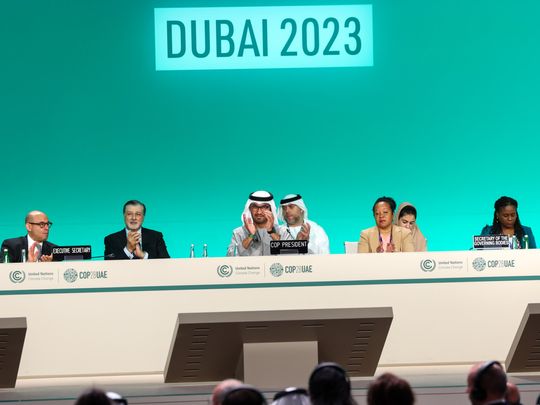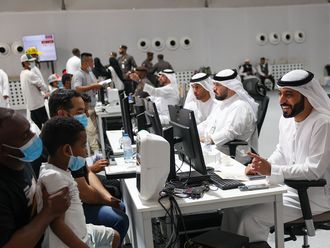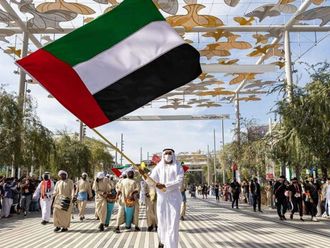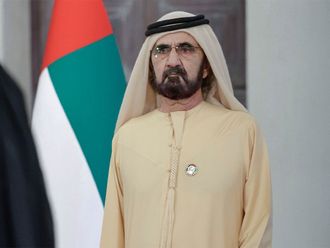
Dubai: The UN-led COP28 climate conference concluded in Dubai on Wednesday after Parties adopted the landmark ‘UAE Consensus’ on climate change, where representatives from nearly 200 countries have agreed to begin reducing fossil fuels to turn the tide on climate change.
The deal called on Parties to “transition away from fossil fuels in a just, orderly and equitable manner, accelerating action in this critical decade” to achieve net zero by 2050.
The UAE Consensus - championed by the UAE Presidency - was gavelled by COP28 President Sultan Al Jaber after two weeks of negotiations, which intensified over the last two days as the conference went into overtime. He received a standing ovation from the delegations representing 198 countries at the climate conference. Al Jaber said: “Together, we have confronted realities and set the world in the right direction.”
Al Jaber said the deal’s true success lies in its implementation.
“An agreement is only as good as its implementation. We are what we do, not what we say. We must take the steps necessary to turn this agreement into tangible action,” said the COP28 President.
Al Jaber said the deal was reached in the hottest year or record and was a comprehensive response to a Global Stocktake revealing countries’ shortcomings in meeting the Paris Agreement goals, notably the commitment to limit global heating to 1.5C above preindustrial levels.
Commitments to reduce emissions
To reduce greenhouse gas emissions (GHGs), the UAE Consensus has asked countries to submit economy-wide Nationally Determined Contributions (NDCs), and the deal includes a new specific target to triple renewables and double energy efficiency by 2030.
It has also asked countries to “accelerate the efforts towards the phase-down of unabated coal power” and “substantially reduce non-carbon-dioxide emissions, including methane emissions by 2030”.
The document has asked countries to “accelerate the reduction of emissions from road transport on a range of pathways, including through development of infrastructure and rapid deployment of zero and low-emission vehicles”.
“Phasing out inefficient fossil fuel subsidies that do not address energy poverty or just transitions as soon as possible” has also been included in the final text.
End of the fossil fuel era?
The Global Stocktake is considered the central outcome of COP28 – as it contains every element under negotiation and can now be used by countries to develop stronger climate action plans by 2025. However, unlike its earlier iterations, the agreement did not explicitly commit to the phase-out or phase-down fossil fuels.
However, UN Climate Change Executive Secretary Simon Steill told the media: “COP28 also needed to signal a hard stop to humanity’s core climate problem - fossil fuels and their planet-burning pollution.”
“Whilst we didn’t fully turn the page on the fossil fuel era in Dubai, this is the beginning of the end,” said Stiell.
Moreover, the text also included the use of “transition fuels” (natural gas, for example), which countries like Colombia and Antigua and Barbuda said could lead to permanent use in developing countries.
Marina da Silva, Minister of Environment and Climate Change, Brazil, welcomed the deal and has said the focus now has to be a just transition so the world can end fossil fuels. “The challenge of delivering this 1.5C mission will depend on everyone,” she said.
Many developed countries, including the EU, the US and several vulnerable nations, had joined a coalition of nearly 100 countries in publicly pushing for a phase-out of coal, oil and gas.
Wopke Hoekstra, European Commissioner for Climate Action, said: “Humanity has finally done what is long overdue. Thirty years we’ve spent to arrive at the beginning of the end of fossil fuels.”
‘A good start’
While presenting their closing remarks at the plenary, several countries expressed concerns that the text needed more details on emission reductions and financing means for the world’s most vulnerable.
US Special Envoy for Climate John Kerry said: “While all of us can find a paragraph, sentence, or section where we would’ve liked something else to appear. But in a multilateral venue to have as strong a document as has been put together, I find this a cause of optimism. The fact is that this document sends a powerful message to the world.”
Members of the Global Campaign to Demand Climate Justice said it is now time for rich countries to ‘walk the talk’.
Asad Rehman, Executive Director, War on Want said: “Only genuine international cooperation with rich countries leading the way would show that those trapped in energy poverty, a growing debt crisis and without the financial means or technologies to transition that they are not being left behind.”
The GST monitors its implementation and evaluates the collective progress in achieving the agreed goals.
The agreement has set new global benchmarks for climate action by setting guidelines for mitigation, adaptation, capacity-building, means of implementation and finance, among others.
Under mitigation, the agreement, for the first time in history, included a call for countries to commit to: “transitioning away from fossil fuels in energy systems, in a just, orderly and equitable manner, accelerating action in this critical decade, to achieve net zero by 2050 in keeping with the science”.
Major commitments:
A reference to transitioning away from all fossil fuels to enable the world to reach net zero by 2050
A significant step forward in the expectations for the next round of Nationally Determined Contributions (NDCs) by encouraging “economy-wide emission reduction targets.”
Building momentum behind the financial architecture reform agenda, recognising the role of credit rating agencies for the first time, and calling for a scale-up of concessional and grant finance
A new, specific target to triple renewables and double energy efficiency by 2030
Recognising the need to significantly scale up adaptation finance beyond the doubling to meet urgent and evolving needs.
COP28: Financial pledges and contributions
-Climate Finance: $30 billion from the UAE, $200 million in Special Drawing Rights, and $31.6 billion from Multilateral Development Banks (MDBs)
-Renewable Energy: $5 billion
-Green Climate Fund: $3.5 billion (increasing second replenishment to $12.8 billion)
-Food: $3.1 billion
-Health: $2.9 billion
-Nature: $2.6 billion
-Relief, Recovery and Peace: $1.2 billion
-Methane: $1.2 billion
-Loss and Damage Fund: $792 million
-Technology: $568 million
-Local Climate Action: $467 million
-Water: $150 million
-Adaptation Fund: $134 million
-Least Developed Countries Fund: $129.3 million
-Cooling: $57 million
-Special Climate Change Fund (SCCF): $31 million
-Clean Cooking: $30 million
-Gender: $2.8 million
UAE COP28 Presidency’s Action Agenda
Outside the Global Stocktake, COP28 delivered and negotiated several historic outcomes.
This includes the decision to operationalise the Loss and Damage, securing $792 million of early pledges, providing a framework for the Global Goal on Adaptation (GGA), and institutionalising the role of the Youth Climate Champion to mainstream youth inclusion at future COPs.
Throughout 2023, the COP28 Presidency has taken steps to deliver beyond the negotiated text through its ‘Action Agenda’.
$85 billion in funding
Under the total Action Agenda at COP28, over $85 billion in funding has been mobilised, and 11 pledges and declarations have been launched. They are:
Launch of Alterra Fund, the UAE’s $30 billion catalytic private finance vehicle, seeks to mobilise $250 billion for global climate action.
‘COP28 UAE Declaration on Agriculture, Food, and Climate,’ embedding sustainable agriculture and food systems in the response to climate change. It has received endorsements from 158 countries.
‘COP28 UAE Declaration on Climate and Health’ to accelerate the development of climate-resilient, sustainable and equitable health systems. 144 countries have endorsed it.
The Global Decarbonization Accelerator (GDA) – a series of energy initiatives across the public and private sectors to speed up the energy transition, including:
The Global Renewables and Energy Efficiency Pledge pledges to triple worldwide installed renewable energy generation capacity to at least 11,000 gigawatts and to double the global average annual rate of energy efficiency improvements to more than 4 per cent by 2030. 132 countries have endorsed it.
The Oil and Gas Decarbonization Charter (OGDC) commits signatories to zero methane emissions, ending routine flaring by 2030 and net-zero operations by 2050 at the latest. To date, 52 companies, representing over 40 per cent of global oil production, have signed up for it.
The ‘Coalition for High Ambition Multilevel Partnerships (CHAMP) pledges’ to advance the integration of sub-national leaders in climate-related decision-making. 67 countries have endorsed it.
The COP28 Presidency’s receipt of the Global Youth Statement: the collective climate policy demands of children and youth from over 160 countries worldwide. Its delivery follows a year of youth engagements championed by Shamma Al Mazrui, the first official Youth Climate Champion.








